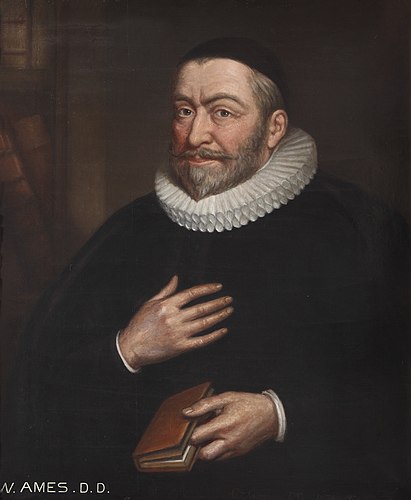1.
In contentment and joy are found the height and perfection of all love towards our neighbor.
William Ames
2.
The attributes of God tell us what He is and who He is.
William Ames
3.
The will of God is eternal because He does not begin to will what He did not will before, nor cease to will what He willed before.
William Ames
4.
Faith is the virtue by which, clinging-to the faithfulness of God, we lean upon him, so that we may obtain what he gives to us.
William Ames
5.
From faith, hope, and love, the virtues of religion referring to God, there arises a double act which bears on the spiritual communion exercised between God and us; the hearing of the word and prayer.
William Ames
6.
Sanctification is not to be understood here as a separation from ordinary use or consecration to some special use, although this meaning is often present in Scripture, sometimes referring to outward and sometimes to inward or effectual separation.
William Ames
7.
Sanctification is the real change in man from the sordidness of sin to the purity of God's image.
William Ames
8.
The virtue of contentment is the acquiescence of the mind in the lot God has given
William Ames
9.
The will of God is single and totally one in Him.
William Ames
10.
The good pleasure of God is an act of the divine will freely and effectively determining all things.
William Ames
11.
The starting point of sanctification is the filthiness, corruption, or stain of sin.
William Ames
12.
Hearing the word is the devout receiving of the will of God.
William Ames
13.
Nothing exists from eternity but God, and God is not the matter or a part of any creature, but only the maker.
William Ames
14.
Although the whole man partakes of this grace, it is first and most appropriately in the soul and later progresses to the body, inasmuch as the body of the man is capable of the same obedience to the will of God as the soul.
William Ames
15.
Hence the end of the world should be awaited with all longing by all believers.
William Ames
16.
In the exercise of God's efficiency, the decree of God comes first. This manner of working is the most perfect of all and notably agrees with the divine nature.
William Ames
17.
Everyone who understands the nature of God rightly necessarily knows that God is to be believed and hoped in, that he is to be loved and called upon, and to be heard in all things.
William Ames
18.
This subsistence, or manner of being of God is his one essence so far as it has personal properties.
William Ames
19.
Participation in the blessings of the union with Christ comes when the faithful have all the things needed to live well and blessedly to God.
William Ames
20.
The efficiency of God may be understood as either creation or providence.
William Ames
21.
Theology is the doctrine or teaching of living to God.
William Ames
22.
Therefore, the church is not absolutely necessary as an object of faith, not even for us today, for then Abraham and the other prophets would not have given assent to those things which were revealed to them from God without any intervening help of the church.
William Ames
23.
The inward offer is a kind of spiritual enlightenment, whereby the promises are presented to the hearts of men, as it were, by an inward word.
William Ames
24.
The first act of religion, therefore, concerns those things which are communicated to us from God. The other concerns those things which we yield to God.
William Ames
25.
The relative property of the Son is to be begotten, that is, so to proceed from the Father as to be a participant of the same essence and perfectly carry on the Father's nature.
William Ames
26.
The ordinary ministry is that which receives all of its direction from the will of God revealed in the Scriptures and from those means which God has appointed in the church for its continual edification.
William Ames
27.
An idea in man is first impressed upon him and afterwards expressed in things, but in God it is only expressed, not impressed, because it does not come from anywhere else.
William Ames
28.
Active creation is conceived as a transitive action in which there is always presupposed an object about which the agent is concerned; it is virtually but not formally transitive because it makes, not presupposes, an object.
William Ames
29.
The goodness of a thing created is the perfection of its fitness for the use which it serves. Now that use is either particular or universal.
William Ames
30.
The passive receiving of Christ is the process by which a spiritual principle of grace is generated in the will of man.
William Ames

